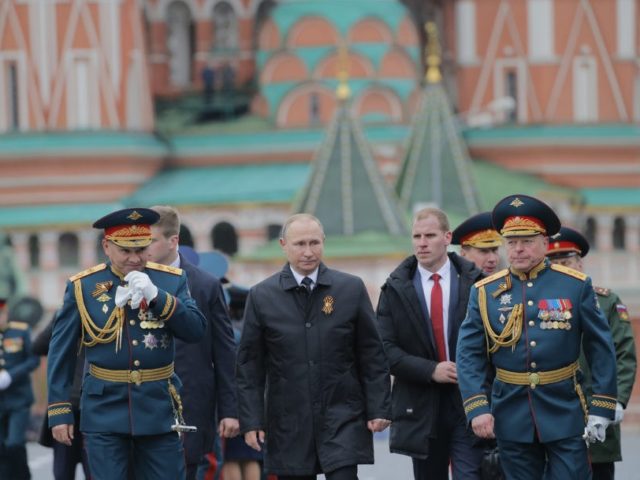On Monday morning, Russia’s Defense Ministry announced that planes from the U.S.-led coalition in Syria will be treated as hostile targets west of the Euphrates River. The announcement was made in response to the U.S. downing of a Syrian warplane on Sunday.
The Syrian plane was shot down by a U.S. Navy F/A-18E Super Hornet fighter after it dropped bombs near positions held by the Kurdish-led Syrian Democratic Forces, a major American ally in Syria. The SDF reported a number of its troops were injured by a ground attack from forces loyal to the regime of Bashar Assad, and it was forced to fall back from the town of Ja’Din, a town west of the Islamic State capital of Raqqa.
The SDF reported coming under attack from the Syrian regime’s Su-22 warplane after it was pushed out of Ja’Din. The U.S.-led coalition announced that it shot down the Syrian plane “in accordance with rules of engagement and in collective self-defense of coalition-partnered forces.”
“The demonstrated hostile intent and actions of pro-regime forces toward coalition and partner forces in Syria conducting legitimate counter-ISIS operations will not be tolerated,” the coalition stated.
According to the U.S. military, the pilot of the Syrian plane was able to eject.
“The attack stresses coordination between the US and ISIS, and it reveals the evil intentions of the US in administering terrorism and investing it to pass the US-Zionist project in the region,” the Syrian government responded.
The Washington Post notes it was the first American downing of a Syrian jet since U.S. forces entered Syria’s civil war in 2014, the first time a U.S. plane brought down a manned hostile aircraft in over a decade, and the fourth time in a month the U.S. military has been obliged to fire on pro-regime forces.
The Post reports that U.S. commanders used a special “deconfliction channel” to contact Russia before firing on the Syrian plane, in an effort to prevent the situation from escalating, and also conducted a “show of force” to warn Syrian forces away before resorting to live fire.
Despite these measures, Russia declared the American action illegal on Monday.
“Repeated combat actions by U.S. aviation under the cover of counterterrorism against lawful armed forces of a country that is a member of the U.N. are a massive violation of international law and de facto a military aggression against the Syrian Arab Republic,” said the Russian Defense Ministry.
Russia warned that planes from the U.S.-led coalition will be “tracked by the Russian ground and air anti-aircraft defense systems as air targets in the areas where Russian aviation is on combat missions in the Syrian sky.” The threat came up just short of promising to fire on those targets.
The Russians claimed the U.S. did not use the de-confliction hotline to warn them before shooting down the Syrian jet, and said Russian planes operating in the area could have been jeopardized. According to the Russian Defense Ministry’s statement, it will no longer participate in the de-confliction hotline.
The Associated Press notes that it made the same threat after the U.S. missile attack on a Syrian airbase in April, which would raise the question of whether anyone on Russia’s end picked up the phone, literally or figuratively speaking, when the U.S. used the de-confliction system on Sunday.
On Monday, the Syrian Democratic Forces said they will retaliate against any further attack from the Assad regime or its allies.
“The regime’s forces have mounted large-scale attacks using planes, artillery, and tanks since June 17,” an SDF spokesman said, as quoted by Reuters. “If the regime continues attacking our positions in Raqqa province, we will be forced to retaliate… and defend our forces.”
Reuters notes that the Syrian government has previously suggested it would focus its efforts on other parts of Raqqa during the drive to liberate it from the Islamic State, so the attack on SDF forces appears to mark a change in policy. SDF units have reportedly liberated four districts of the city from ISIS and is fighting over another three, so the Syrian attack may have been meant to stall out the SDF offensive and prevent the Kurdish-led coalition from controlling a large portion of the city.

COMMENTS
Please let us know if you're having issues with commenting.